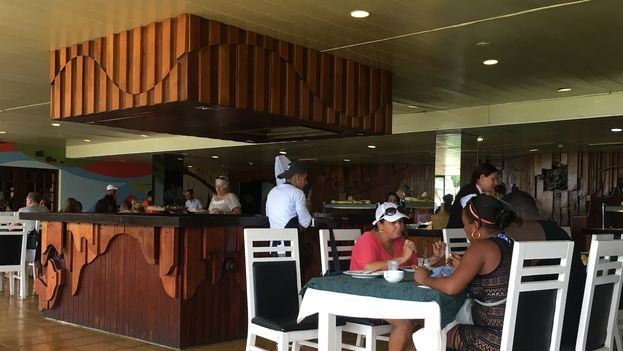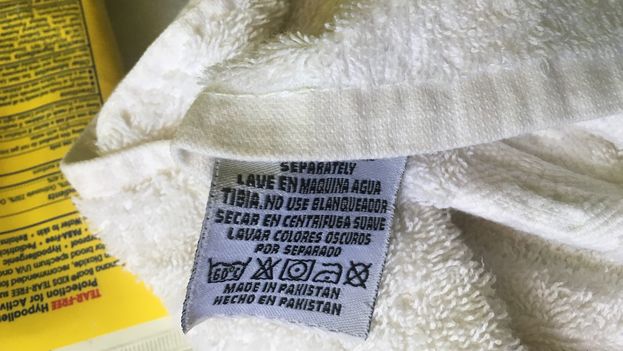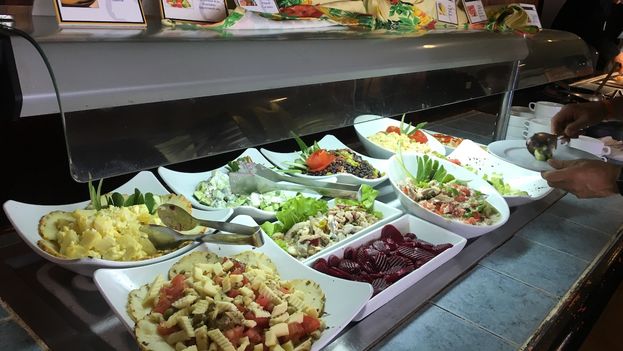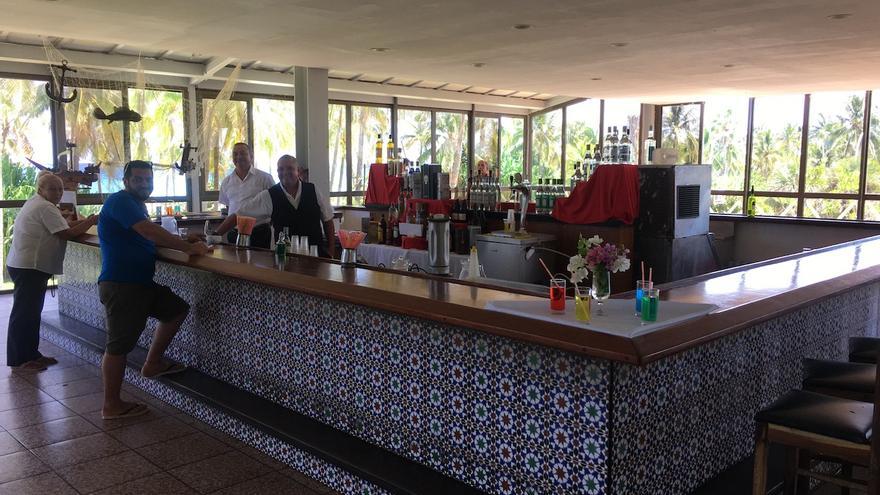
![]() Luz Escobar / 14ymedio, Varadero / Havana, 11 October 2018 — For those who are looking for local flavor, it is frustrating to wake up to Colombian coffee, have fish from the distant shores of northern Europe and realize that it is easier to find a Heineken in the hotel bar than a Cuban Cristal. In these hotels it is more common to see tuna than snapper, an apple than a mango and artificial sweetener than the local sugar.
Luz Escobar / 14ymedio, Varadero / Havana, 11 October 2018 — For those who are looking for local flavor, it is frustrating to wake up to Colombian coffee, have fish from the distant shores of northern Europe and realize that it is easier to find a Heineken in the hotel bar than a Cuban Cristal. In these hotels it is more common to see tuna than snapper, an apple than a mango and artificial sweetener than the local sugar.
“The mattresses are Cuban but all the linens, the detergent in which they are washed and even the napkins we use in the hotel come from another country,” laments a maid at the downtown Hotel Sevilla, a local icon on Havana’s Prado that, according to one tour operator, offers its visitors “a space with Moorish inspiration and local flavor.”
The courtyard bar, a space which features blue ceramic tiles and a musical trio playing Cuban trova standards, offers guests Spanish olives, Russian vodka, French fries from Mexico and slices of Gouda cheese wrapped around sausages, which are also imported. With the exception of rum and local beer, everything else seems to have come from a Panama Canal wholesale market.
Towels from Pakistan, yoghurt from Spain and chlorine for the pool imported from a Latin American country are some of the products that allow the Puntarena de Varadero Hotel to function an day-to-day basis. It is the same situation throughout Cuba, where the large amount of imported supplies and food is a major drain on profits in the tourism sector.

From the pat of butter that a guest has at breakfast to the orange juice used in mixed drinks, a large percentage of what is offered at these establishments fools the guests, who are expecting to be served mostly Cuban products.
The Havana Consulting Group conducted a poll which surveyed 347,833 tourists who visited Cuba between March 2016 and February 2017. It found that, along with sanitary conditions, the most common complaint was the lack of variety in food choices and the preponderance of imported products over local ones.
Beatriz, a Mexican woman who stayed for a week this summer with her family in Puntarena, told 14ymedio that the “lack of variety” was “the downside” of her stay. “On the fourth day we had to go to a private restaurant because our hotel didn’t have basics like lemons or fresh oranges,” she says.
In 2013, after decades and decades of prohibiting such activity, the government of Raúl Castro gave permission for independent producers to sell directly to hotels catering to domestic and foreign tourists. Previously, hotels had purchased their supplies exclusively through contracts with state agencies while importing what they could from abroad.
The approval process for such sales, however, is complicated and several state agencies must oversee, approve and control the distribution from the fields to the buffet tables.
Though he prefers to remain anonymous in order to remain in the program, Carlos is one of the more than fifty fruit, vegetable and grain producers in Matanzas province who have been given approval by the Selected Farming Products Company to sell their crops to hotels.
The farmer has a plot of land reserved for the cultivation of mango, melon, guava and papaya, which he has managed to sell to resort hotels.
Carlos sells part of what he grows through a cooperative to which he belongs on the outskirts of Cárdenas, a town whose main source of income is Varadero, the most famous beach resort in Cuba. “They have helped us get some important supplies such as boxes for the collection of fruit and seeds but the truth is it hasn’t worked out well.”

“A lot of good fruit was lost,” he notes. “We delivered it to them but the state-run company did not get it to the hotels in time.” After tropical storm Albert at the end of May the situation worsened. “We lost more in the markets than in the fields,” he laments.
After that fateful day, during which his fields were flooded, Carlos switched from fruits to vegetables. “They are faster to harvest and package, although they can be more fragile to transport. Many hotels in Varadero will choose processed carrots and cabbage before paying for a lettuce from here,” he says.
Though a hotel chain can theoretically contract directly with private or cooperative producers, throughout the entire production chain “the hand of state agencies is always present, certifying the product quality, verifying the contract terms are being fulfilled and making sure the farmer is not making too much money,” says Carlos.
To be part of this distribution chain, farmers must join the Agricultural Business Group but then get the resources for their harvests from the Logistics Business Group of the Ministry of Agriculture, a huge, inefficient mastodon they distrust.
“What is needed are agricultural purchasing centers to facilitate exchanges between producers and tourism administrators,” says Medardo, an agricultural engineer who describes himself as “someone who could free up this process.”
Medardo believes that what is needed are more markets “with greater visibility so that hotel managers know where they are and what they have to offer.” Years after they were closed, some of these points of sale have been reopned in provinces such as Pinar del Río, Villa Clara, Holguin, Las Tunas and Santiago de Cuba. The agricultural expert believes, however, that this is not enough.
“It should be like a wholesale market, where producers bring their fruits, vegetables and produce to be bought directly by hotels, but also a place to sign purchase agreements without government intermediaries, “he says.
Until 1959 Cuba was a net exporter of agricultural products, but times have changed. “There is a culture of looking for everything overseas, from butter to mangoes,” laments Medardo. “Even the shrimp tourists eat are mostly frozen imports, to say nothing of meat, which is brought in almost entirely from other countries.”

In 2015 — just as the island’s tourism boom was beginning in the wake of the thaw in diplomatic relations between the Cuba and the United States — a report published by the Center for the Study of the Economy was already warning of a troubling disconnect between tourism and the nation’s industrial output. This situation has worsened due to the growth in tourism, which experienced more than four million visitors in 2017, and the subsequent increase in the demand for food and cleaning supplies.
The report warned of a growing “trade deficit resulting from substituting domestically produced items with imports” and criticized the “long approval process experienced by domestic producers trying to import supplies and parts,” which has made it easier and faster to simply bring in certain goods from overseas.
The most experienced tourists realize this immediately and ask if there are no “local tapas, with a Cuban flavor.” But employees can offer them little more than some dried produce, such as almonds and raisins, which come already packaged with a foreign label. There are no plantain chips, roasted corn-on-the-cob, pork rinds or even a Cuban tamale.
A few meters away from Hotel Sevilla, however, street vendors hawk their wares — roasted peanuts, corn chips and all manner of fritangas — in what seems like a world completely disconnected from the one inside the hotel. A distant galaxy where domestic products have more presence than imported ones.
_________________________
The 14ymedio team is committed to serious journalism that reflects the reality of deep Cuba. Thank you for joining us on this long road. We invite you to continue supporting us, but this time by becoming a member of 14ymedio. Together we can continue to transform journalism in Cuba.
